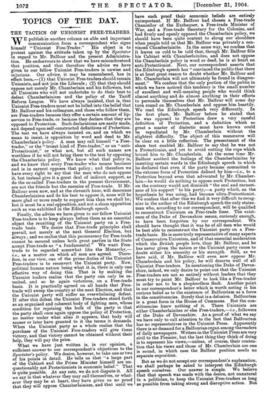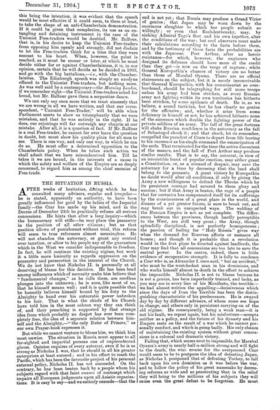THE TACTICS OF UNIONIST FREE-TRADERS.
WE publish in another column an able and important communication from a correspondent who signs himself "Unionist Free-Trader." His object is to protest against the attitude taken up by the Spectator in regard to Mr. Balfour and the present Administra- tion. He endeavours to show that we have misunderstood that position, and that therefore the advice we have given to our fellow Unionist Free-traders is unwise and injurious. Our advice, it may be remembered, has in effect been,—(1) that Unionist Free-traders should remain Unionists, and not join the Liberals ; (2) that they should oppose not merely Mr. Chamberlain and his followers, but all Unionists who will not undertake to do their best to defeat Chamberlainism and the policy of the Tariff Reform League. We have always insisted, that is, that Unionist Free-traders must not be lulled into the belief that Mr. Balfour and his colleagues, and those who follow them, are Free-traders because they offer a certain amount of lip- service to Free-trade, or because they declare that they are opposed to Protection. Such declarations are easily made, and depend upon self-constructed definitions of Protection. The test we have always insisted on, and on which we mean to insist, is opposition by word and deed to Mr. Chamberlain's policy. A man may call himself "a Free- trader," or the "truest kind of Free-trader," or an " anti- Protectionist," or what not, but all such names are worthless if he will not bring them to the test by opposing the Chamberlain policy. We know what that policy is, and we know that every Free-trader who means business and is in earnest opposes that policy ; and therefore we have every right to say that the men who do not oppose it, but instead give it a great deal of indirect support, as do the so-called Free-traders in the present Government, are not the friends but the enemies of Free-trade. If Mr. Balfour even now, and at the eleventh hour, will denounce Chamberlainism and do his best to oppose it, none will be more glad or more ready to support him than we shall be; but it must be a real opposition, and not a sham opposition such as was exhibited in the Edinburgh speech.
Finally, the advice we have given to our fellow Unionist Free-traders is to keep always before them as an essential object the reuniting of the Unionist party on a Free- trade basis. We desire that Free-trade principles shall prevail, not merely at the next General Election, but always ; and we realise that this permanency for Free-trade cannot be secured unless both great parties in the State accept Free-trade as "a fundamental." We want Free- trade to be regarded somewhat like the Monarchy,- i.e., as a matter on which all men are agreed. There- fore, in our view, one of the prime duties of the Unionist Free-traders is to reconvert the Unionist party. Now, political human nature being what it is, there is only one effective way of doing this. That is by making the Unionist leaders realise that the party can only be re- united, and so be again victorious, on a Free-trade basis. It is practically agreed on all hands that Free- trade will sweep the country at the next Election, and that the Unionist party will suffer an overwhelming defeat. If after this defeat the Unionist Free-traders stand forth as an organised and coherent body of fighting men, whose condition for rejoining the bulk of the party is that the party shall once again oppose the policy of Protection, no matter under what alias it appears, that body will sooner or later have granted to it the terms it demands. When the Unionist party as a whole realise that the purchase of the Unionist Free-traders will give them victory, and that victory cannot be obtained without their help, they will pay the price.
What we have just written is, in our opinion, a sufficient answer to our correspondent's objections to the Spectator's policy. We desire, however, to take one or two of his points in detail. He tells us that "a large part of the Cabinet and the Prime Minister himself are un- questionably not Protectionists in economic belief." That is quite possible. At any rate, we do not dispute it. All we say is that whatever they may call themselves, or what- ever they may be at heart, they have given us no proof that they will oppose Chamberlainism, and that until we Chancellor of the Exchequer, a Free-trade Minister of War, and a Free-trade Secretary for the Colonies, and had firmly and openly opposed the Chamberlain policy, we should have been quite content to shrug our shoulders when people told us that Mr. Balfour was privately a con- vinced Chamberlainite. In the same way, we confess that it leaves us cold to be told that, though Mr. Balfour fills his Cabinet with Chamberlainites, and does not oppose the Chamberlain policy in word or deed, he is at heart an anti-Protectionist. Next, our correspondent asserts that the Edinburgh speech has "convinced the public that there is at least great reason to doubt whether Mr. Balfour and Mr. Chamberlain will not ultimately be found in disagree- ment." We confess that the only portion of the public in which we have noticed this tendency is the small number of excellent and well-meaning people who would think almost anything and do almost anything in their efforts to persuade themselves that Mr. Balfour will some day turn round on Mr. Chamberlain and oppose him heartily. We read the Edinburgh speech very differently. In the first place, Mr. Balfour before he stated that he was opposed to Protection drew a very careful definition of Protection, and a definition which so great a master of dialectic must have known could be repudiated by Mr. Chamberlain without the slightest difficulty. The object of this manceuvre will be clear on a little reflection. The presentment of the sham test enabled Mr. Balfour to say that he was not a Protectionist, and vet to avoid cutting the rope which bound him to Mr. Chamberlain. At the same time Mr. Balfour soothed the feelings of the Chamberlainites by inserting certain words in the Edinburgh speech in which he declared that even if the party became committed to the extreme form of Protection defined by him—i.e., to a Protection beyond even that advocated by Mr. Chamber- lain—he would do nothing to oppose such Protection, but on the contrary would not diminish "the zeal and earnest- ness of his support" to his party,—a party which, on the hypothesis he was using, had become ultra-Protectionist. We confess that after this we find it very difficult to recog- nise in the author of the Edinburgh speech the only states- man who, according to our correspondent, will be qualified to reconstruct Unionism on Free-trade lines. The exist- ence of the Duke of Devonshire seems, curiously enough, to have been forgotten by our correspondent. We should have thought that it was he of all men who would be best able to reconstruct the Unionist party on a Free- trade basis. He is more truly representative of many aspects of Conservative Unionism, and of that essential moderation which the British people love, than Mr. Balfour, and he has never given the nation or the Unionist party cause to doubt either his sincerity or his strength. Still, as we have said, if Mr. Balfour will even now oppose Mr. Chamberlain and his policy, he will deserve well of all Unionist Free-traders. In mentioning the Duke of Devon- shire, indeed, we only desire to point out that the Unionist Free-traders are not so entirely without leaders that they must try to paint Mr. Balfour to look like a Free-trader in order not to be a shepherdless flock. Another point in our correspondent's letter which is worth noting is his curious belief as to the existence of Balfourism as a force in the constituencies. Surely that is a delusion. Balfourism is a great force in the House of Commons. But the con- stituencies know nothing of it. There Unionists are either Chamberlainites or else Free-traders,—i.e., followers of the Duke of Devonshire. As a proof of what we say we have only to call attention to the fact that Balfourism has no representatives in the Unionist Press. Apparently there is no demand for a Balfourian organ among therea,ders of daily newspapers. Writers in the Unionist Press are very civil to the Premier, but the last thing they think of doing is to represent his views,—unless, of course, their conten- tion that his views and those of Mr. Chamberlain are one is sound, in which case the Balfour position needs no separate exposition.
But as we do not accept our correspondent's explanation, we shall perhaps be asked to interpret the Edinburgh speech ourselves. Our answer is simple. We believe that that speech was made with the desire, not unnatural in a politician, to keep the Unionist Free-traders as long as possible from taking strong and disruptive action. But this being the intention, it was evident that the speech would be most effective if it could seem, to them at least, to take the shape of an anti-Chamberlain demonstration. If it could be given that complexion, its use as an en- tangling and detaining instrument in the case of the Unionist Free-traders would be doubled. Mr. Balfour, that is, in his desire to keep the Unionist Free-traders from opposing him openly and strongly, did not disdain to let the Free-traders think for a time that they were nearest to his heart. When, however, the point is reached, as it must be sooner or later, at which he must decide either for or against Chamberlainism, it is, in our opinion, certain that he will decide as he decided in 1903, and go with the big battalions,—i.e., with the Chamber- lainites. The Edinburgh speech was simply an anodyne offered to the Unionist Free-traders, but nothing more. As was well said by a contemporary—the Morning Leader, if we remember right—the Unionist Free-traders asked for bread, but Mr. Balfour gave them a serpentine dance.
We can only say once more that we trust sincerely that we are wrong in all we have written, and that our corre- spondent, "Unionist Free-Trader," will be able when Parliament meets to show us triumphantly that we were mistaken, and that be was entirely in the right. If he does, our rejoicings will far outweigh any chagrin at our mistake. After all, it is a question of fact. If Mr. Balfour is a real Free-trader, he cannot for ever leave the question in doubt, but must show his quality plain for all men to see. There is one way, and only one way, in which he can do so. He must offer a determined opposition to the Chamberlain policy. When he takes such action we shall admit that we have misunderstood him. Till he takes it we are bound, in the interests of a cause in which the safety and welfare of the Empire are so deeply concerned, to regard him as among the chief enemies of Free-trade.



































 Previous page
Previous page